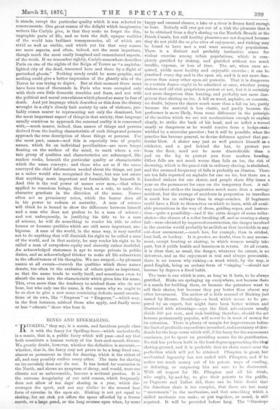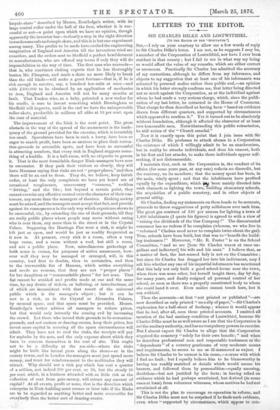RINKS AND RINKMAKING.
RINKING," they say, is a mania, and facetious people class it with the fancy for Spelling-bees—which undoubtedly is a mania, that is, a public fancy which will pass—and say that both constitute a human variety of the foot-and-mouth disease. We greatly doubt, however, whether the definition is accurate,— whether, that is,- the fancy may not prove to be a long-lived one, almost as permanent as that for dancing, which is the oldest of all, and may possibly outlive every other. The taste for skating on ice certainly does not die out. It has lasted for centuries in the North, and shows no symptom of decay, and would, were our climate not so unfavourable, become a national passion. It is the extreme irregularity of our cold season, which frequently does not allow of ten days' skating in a year, which dis- courages the sport, and not any dislike to the second best form of exercise in the open air. Rinking is not yet equal to skating, for no rink yet offers the space afforded by a frozen marsh, or a large pond, or the long courses open when, by some happy and unusual chance, a lake or a river is frozen hard enough to bear. Nobody will ever get out of a rink the pleasure that is to be obtained from a day's skating on the Norfolk Broads or the Dutch Canals, but still healthy pleasures are not despised because they do not yield the ne plus ultra of enjoyment, and rinking may be found to have met a real want among city populations. There is a distinct and probably instinctive crave for violent exercise among urban populations, which is com- pletely gratified by rinking, and gratified without too much trouble, expense, or loss of time. The art, when once ac- quired, yields most healthy and enjoyable exercise ; it can be practised every day and in the open air, and it is not more dan- gerous than many other open-air pursuits. That it is dangerous in a certain degree ought to be admitted at once, whether young rinkers and old rink proprietors protest or not, but it is certainly not more dangerous than hunting, and probably not more dan- gerous than skating on ice. A fall on wood, asphalte, or concrete, no doubt, injures the skater much more than a fall on ice, partly because the material is less elastic, and partly because the performer is more likely, from some difference in the principle of the motion which we are not mechanicians enough to explain clearly, to strike the back of his head, and so inflict a wound nearly as dangerous as he would receive from a hedge-stake wielded by a muscular garotter ; but it will be possible, when the practice has become general, to devise defences against that par- ticular blow. A skater may just as well protect himself as a cricketer, and a pad behind the hat, to protect you from the floor, need not be more discreditable than a pad on the leg to protect you from modern bowling. Other falls are not much worse than falls on ice, the risk of drowning, which is the grand risk in ordinary skating, is abolished, and the assumed frequency of falls is probably an illusion. There are ten falls reported on asphalte for one on ice, but there are a hundred tinkers for one skater, and people skate fifty times a year on the permanent for once on the temporary floor. A rail- way accident strikes the imagination much more than a carriage accident, but the average of accidents in proportion to travellers is much leas on railways than in stage-coaches. if beginners could have a Rink to themselves on which to learn, with all avail- able precautions in the way of dress, guiding-ropes, and instruc- tion—quite a possibility—and if the extra danger of some roller- skates—the chance of a roller breaking off, and so causing a sharp fall—were obviated by improved construction, the danger involved in the exercise would probably be as little as that inevitable in any out-door amusement,—much less, for example, than in cricket, foot-ball, or hockey. It is greater, no doubt, than in any amuse- ment, except hunting or skating, in which women usually take part, but it yields health and bonniness in return. At all events, it is clear that, as usual, the danger, whatever its extent, is no deterrent, and as the enjoyment is real and always procurable, there is no reason why rinking—a word which, by the way, is good English, being an archaic form of "ringing "—should not become by degrees a fixed habit.
The taste is one which is sure, as long 'as it lasts, to be always gratified. Rinks are springing up everywhere, not because there is a mania for building them, or because the patentees want to sell their skates, but because they pay better than almost any other investment. The author of a little manual of Kinking just issued by Messrs. Routledge—a book which seems to be pre- pared by an expert, but might have been better written and illustrated with advantage—says the Rink adventurers usually divide 300 per cent., and rink-building therefore, should the art become permanently popular, will never be in want of money for its extension. There is plenty of margin for improvement before the limit of profitable expenditure is reached, and a certainty of divi- dends for the large sums which will, if the fancy for the amusement continues, yet be spent on providing means for its gratification. No rink has yet been built in the least degree approaching the ideal skating-ground, and it is probable that no skate comes near the perfection which will yet be attained. Plimpton is great, but mechanical ingenuity has not ended with Plimpton, and if he makes too much money out of his patent, ways of evading, or defeating, or surpassing him are sure to be discovered. With all respect for Mr. Plimpton and all his rivals, who ought, by-and-by, to give their patents to the public, as Daguerre and Talbot did, there can be little doubt that the American skate is too complex, that there arc too many " movements" in the mechanism, and that something which a skilled mechanic can make, or put together, or mend, is still required. It will be provided before long. The " Stanhope
bicycle-skate" described by Messrs. Routledge's writer, with its large central roller under the ball of the foot, whether it is suc- cessful or not—a point upon which we have no opinion, though apparently the inventor has—is clearly a step in the right direction towards some safe and simple skate, and this is is but one experiment among many. The profits to be made have excited the engineering imagination of England and America till the inventions tried are countless, and the orders sent to Sheffield a perfect bewilderment to manufacturers, who are offered any terms if only they will do impossibilities in the way of time. The first man who succeeds— that is, who convinces rinking experts that he has thoroughly beaten Mr. Plimpton, and made a skate no more likely to break than the old blade—will make a great fortune—that is, if he is rich enough to survive, say, a hundred law-suits at once—and with £100,000 to be obtained by an application of mechanics to iron, England and America will not be many months at fault. That Yankee who, as a baby, patented a new rocker for his cradle, is sure to invent something which Birmingham or Sheffield will improve, until in the end we have the unimprovable roller-skate, producible in millions all alike at 10 per cent. upon the cost of material.
The improvement of the Rink is the next point. The great obstacle in the way of the spread of the amusement is the inade- quacy of the ground provided for the exercise, which is invariably too small. Speculators have been in such a hurry, have been so eager to snatch profit, have been so anxious to place their recrea- tion-grounds in accessible spots, and have been so successful in attracting numbers, that every rink in England suggests some- thing of a huddle. It is a ball-room, with no etiquette to govern it. That is the most formidable danger Rink-managers have now to encounter. If they pack their visitors so closely, they will have Mammas saying that rinks are not " proper places," and then there will be an end to them. They do, we believe, keep fairish order, at least the only complaints we have yet heard are of occasional roughneases, unnecessary "cannons," reckless " driving," and the like ; but beyond a certain point, they cannot exercise any effective control over the character of their cus- tomers, any more than the managers of theatres. Rinking society must be mixed, and the managers must accept that fact, and provide against its consequences in the only way which experience shows to be successful, viz., by extending the size of their grounds, till they are really publio places where people may move without caring who is near them, any more than in the street or in the Crystal Palace. Supposing the Hastings Pier were a rink, it might be left just as open, and would be just as readily frequented as it now is. At present, every rink is a room, often a very large room, and a room without a roof, but still a room, and not a public place. Now, miscellaneous gatherings of both sexes in rooms, for purposes of active amusement, how- ever well they may be managed or arranged, will, in this country, lead first to doubts, then to certainties, and then to the irreversible fiat of Mamma, which settles everything and needs no reasons, that they are not " proper places " for her daughters or " commendable places " for her sons. That fiat cannot be avoided and profits made at one and the same time, by any device of tickets, or balloting, or introductions, all of which are inconsistent with that resort of the universal public which is the manager's object ; but it can be met in a rink, as in the Crystal or Alexandra Palaces, by unusual space, and that space must be provided. Messrs. Routledge's writer advises all managers to reduce prices, but that would only intensify the coming evil by increasing the crowd. Let those who intend their grounds to be recreation- grounds, and not casinos or dancing-rooms, keep their prices, but invest more capital in securing all the space circumstances will admit. They have not to roof the rinks, the receipts will pay for aspbalte by the acre, and the only expense about which they have to concern themselves is the cost of site. This ought not to be a difficulty at the sea-side—where the rinks might be built like lateral piers along the shore—or in the county towns, and in London the managers must just spend more money, and trust for reimbursement to the multitudes they will attract. Why should not a rink pay which has coat a quarter of a million, not indeed 300 per cent, or 30, but the steady 10 per cent. which, in a business attended with so little risk as the collection of rent from gate-money, will attract any amount of capital? At all events, profit or none, that is the direction which enterprise in Rink-building must sooner or later take if the Rinks are to be regarded as anything better and more convenables for everybody than the better sort of dancing-rooms.



































 Previous page
Previous page